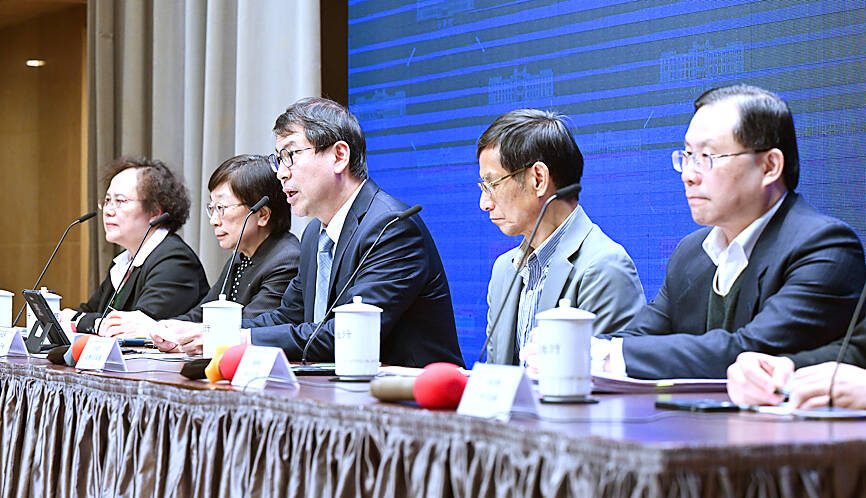The government is to closely monitor the legislative process on a potential ban of TikTok by the US Congress and take the opinions of all stakeholders into consideration, Executive Yuan spokesperson Lin Tze-luen (林子倫) said yesterday.
The US House of Representatives on Wednesday passed a bill asking the short-form video hosting service to divest shares owned by its parent company ByteDance in six months or face a comprehensive ban in the US.
The US Senate has yet to deliberate on the bill.

Photo: Liao Chen-huei, Taipei Times
US President Joe Biden said that he would sign the bill into law if Congress passes it.
Authoritarian regimes frequently abuse freedom of speech in liberal democracies and manipulate election results through social media, Lin said.
TikTok has in some countries become a platform on which cognitive warfare is conducted, he added.
“We have been aware of the risks of accessing TikTok. As such, all government agencies in Taiwan have been banned from using the app since 2019,” Lin said.
The government would ensure freedom of speech in Taiwan would be protected, he added.
“Fake and false information on TikTok has harmed people’s fame, health and privacy, and affected social stability and national security, so democratic nations must be cautious in handling the dissemination of misinformation and disinformation,” Lin said.
Aside from banning government agencies from using TikTok, national security officials have warned that TikTok could pose a threat to national security, Deputy Minister of Digital Affairs Lee Huai-jen (李懷仁) said.
“We have asked that TikTok, like Meta, Google, Line and X, have a representative in Taiwan whom we can contact when there is a need for direct communication. The company would be quickly informed if any illegality was found by the platform,” Lee said.
Banning the use of TikTok would be a major policy change, Lee said, adding that the Executive Yuan would evaluate its legality and feasibility and make a final decision following interdepartmental meetings.

Taiwan has received more than US$70 million in royalties as of the end of last year from developing the F-16V jet as countries worldwide purchase or upgrade to this popular model, government and military officials said on Saturday. Taiwan funded the development of the F-16V jet and ended up the sole investor as other countries withdrew from the program. Now the F-16V is increasingly popular and countries must pay Taiwan a percentage in royalties when they purchase new F-16V aircraft or upgrade older F-16 models. The next five years are expected to be the peak for these royalties, with Taiwan potentially earning

STAY IN YOUR LANE: As the US and Israel attack Iran, the ministry has warned China not to overstep by including Taiwanese citizens in its evacuation orders The Ministry of Foreign Affairs (MOFA) yesterday rebuked a statement by China’s embassy in Israel that it would evacuate Taiwanese holders of Chinese travel documents from Israel amid the latter’s escalating conflict with Iran. Tensions have risen across the Middle East in the wake of US and Israeli airstrikes on Iran beginning Saturday. China subsequently issued an evacuation notice for its citizens. In a news release, the Chinese embassy in Israel said holders of “Taiwan compatriot permits (台胞證)” issued to Taiwanese nationals by Chinese authorities for travel to China — could register for evacuation to Egypt. In Taipei, the ministry yesterday said Taiwan

Taiwan is awaiting official notification from the US regarding the status of the Agreement on Reciprocal Trade (ART) after the US Supreme Court ruled US President Donald Trump's global tariffs unconstitutional. Speaking to reporters before a legislative hearing today, Premier Cho Jung-tai (卓榮泰) said that Taiwan's negotiation team remains focused on ensuring that the bilateral trade deal remains intact despite the legal challenge to Trump's tariff policy. "The US has pledged to notify its trade partners once the subsequent administrative and legal processes are finalized, and that certainly includes Taiwan," Cho said when asked about opposition parties’ doubts that the ART was

If China chose to invade Taiwan tomorrow, it would only have to sever three undersea fiber-optic cable clusters to cause a data blackout, Jason Hsu (許毓仁), a senior fellow at the Hudson Institute and former Chinese Nationalist Party (KMT) legislator, told a US security panel yesterday. In a Taiwan contingency, cable disruption would be one of the earliest preinvasion actions and the signal that escalation had begun, he said, adding that Taiwan’s current cable repair capabilities are insufficient. The US-China Economic and Security Review Commission (USCC) yesterday held a hearing on US-China Competition Under the Sea, with Hsu speaking on